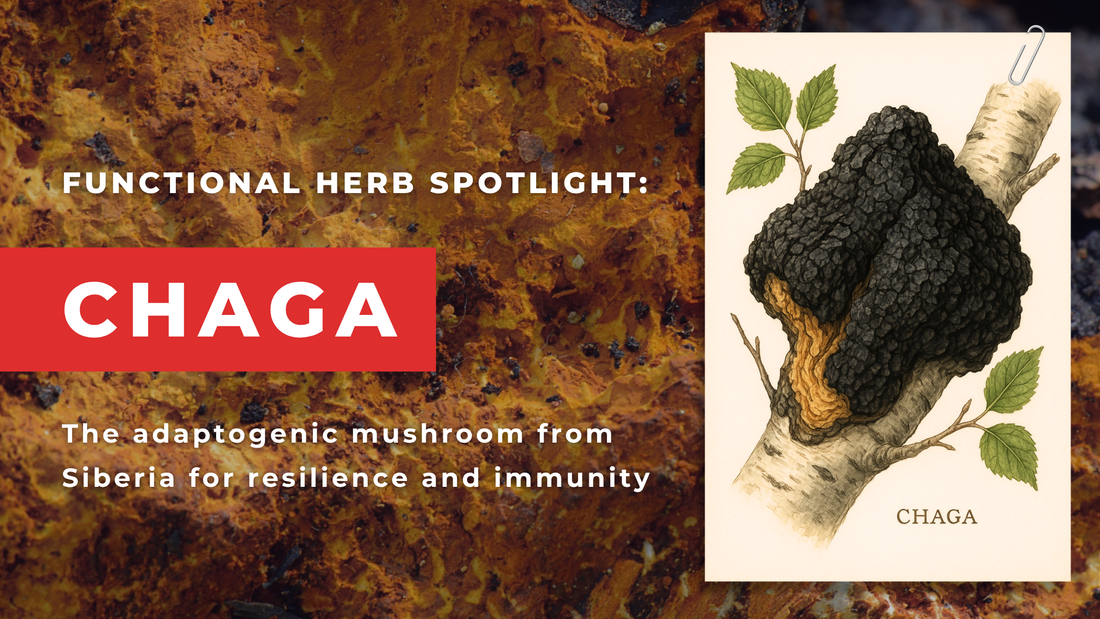
Chaga: The Ancient Detoxifying Adaptogen
This unassuming mushroom has inspired folklore, traditional medicine, and now, modern science. Used as early as the 1600s in Siberian and East Asian medicine, chaga is a nutrient-dense shelf fungus (Inonotus obliquus) that grows on birch trees in cold, northern climates.
🌿 Why Chaga?
Chaga was used as a coffee alternative in northern regions during WWII, and now has scientific evidence for its celebrated adaptogenic, immune-supportive, and antioxidant benefits.
💪 Immune System Ally
Unlike immune system stimulants like echinacea, chaga modulates the immune system. That means it can help activate immune defenses when needed (like during cold season) or calm overactivity (as in autoimmune flare-ups).
Its key compounds—beta-glucans, triterpenoids, and polysaccharides—work with your body’s own immune intelligence to keep it in balance.
This ability has earned chaga a reputation as a preventative tonic for general wellness and seasonal resilience.
🧘 Adaptogenic Stress Relief
Like the other adaptogens in Cauxffee (schisandra, ashwagandha, chaga), chaga helps your body adapt to both physical and emotional stress.
Rather than sedate or stimulate, it regulates your stress response to help bring your nervous system back into balance.
By lowering stress hormones, improving resilience, and supporting your adrenal system, chaga promotes a sense of steady energy and calm alertness.
🔥 Natural Anti-Inflammatory
At the root of countless chronic conditions, from arthritis to eczema to gut issues, is inflammation.
Chaga’s anti-inflammatory effects come from its ability to reduce cytokines like IL-6 and TNF-alpha, as well as suppress COX-2 enzymes, which are often elevated in pain and swelling.
🛡️ Antioxidant Powerhouse
Chaga rivals acai as one of the most antioxidant-rich substances ever discovered, and was traditionally consumed during times of hardship and harsh winters.
Its superoxide dismutase (SOD) and phenolic compounds help protect your cells from the daily wear and tear of oxidative stress, which contributes to aging, inflammation, and chronic disease.
It's deep melanin content makes it valuable for skin health and DNA protection.
🩺 Metabolic & Liver Support
Early studies suggest that chaga may help stabilize blood sugar and support liver detoxification. Its polysaccharides may increase insulin sensitivity, while its antioxidant effects help protect liver cells from damage.
Because the liver is your body’s central filter, this benefit contributes to clearer skin, better digestion, and overall energy.
🧬 Modern Cancer Research Spotlight
Chaga has documented use in Russian folk medicine for tumor-related conditions, and modern science is showing promise around its oncological potential. A 2024 study published in Scientific Reports showed that chaga extract:
- Inhibits the growth of oral cancer cells
- Disrupts their energy metabolism, leading to cell death
- Acts via the STAT3, p38 MAPK, and NF-κB pathways
- Contains active compounds like syringic and protocatechuic acid
These findings are still preliminary, and chaga is definitely not a replacement for medical treatment, but this does highlight chaga’s potential in future cancer therapies.
☕ Not all functional mushrooms are created equal
The chaga we use in Cauxffee is wild-harvested from birch trees in Siberia, where it grows slowly and absorbs potent compounds like betulin and betulinic acid from the tree bark—something lab-grown chaga simply can't replicate. And we use it in its whole, natural form, not a powder or extract!
While mushrooms like lion's mane can overstimulate your nervous system and create adverse reactions in some people, chaga is more of a gentle stabilizer for the nervous system, promoting recovery and calm while also increasing vitality and resilience.
Not to mention, it adds a perfect coffee-like bitterness to round out Cauxffee's complex flavor profile.
